
Consult a qualified lawyer licensed in your jurisdiction if you have specific questions. These technologies can enhance the capabilities of e-billing systems, offering even more efficient invoice processing, predictive analytics for billing, and improved compliance mechanisms. Advanced e-billing systems are designed to accommodate various currencies, allowing for accurate invoicing and financial reporting across different monetary legal e-billing units. Questions regarding virtual currency business activity in New York State may be referred to DFS at email protected and should include your full contact information. Software is scaled appropriately for smaller departments, incorporating the features and enhancements their clients find most useful. It allows for the assignment of phase, task, and activity codes, which facilitates the legal spend analysis that occurs after payment of the invoice.

The Best Legal Billing Software Of 2024
- By informing your clients of your policy from the start, they will know what to expect, how they can pay, and when they’ll need to pay.
- If an organization uses LEDES formatting (which can also be paired with Uniform Task-Based Management System (UTBMS) codes for further clarity), it will reject invoices with errors or incorrect formatting.
- It is a standard practice for outside counsel to submit invoices in LEDES format to companies that use e-Billing systems.
- These types of systems use a central database, which in turn cuts down on duplicative or inconsistent data and extra work steps.
- Most general use accounting and billing software, such as Quickbooks and BQE, can be used with no issue, but legal billing software is designed with law firms in mind.
- This stage can include automatic validation checks, powered by AI, that screen for common errors or non-compliance with billing guidelines and significantly reduce the time spent on manual checks.
Focusing on facilitating invoice processing, ensuring compliance, and enhancing spend analysis, we aim to demystify eBilling and demonstrate its value to in-house legal departments. Essentially, legal e-billing refers to the use of electronic systems to manage the billing and payment processes between law firms and their clients. Enforcement of outside counsel Billing Guidelines reduces cost, changes lawyer behavior, and changes the way law firms manage your matters. E-Billing technology promises to improve internal invoice review processes and reduce outside counsel legal spend.
- However, as previously mentioned, it’s also important to consider standard invoicing requirements larger companies may require when electronically billing for law firms.
- Gone are the days when most legal professionals would manually track their billable hours, create and mail an invoice, travel to the bank to process the check, and finally, record the payment.
- These tasks include time tracking, invoice generation, and invoice delivery.
- The applicant’s NMLS Identification Number must be included on every hard-copy document submitted to the Department.
- Brightflag’s e-billing platform uses generative AI to generate summaries of the work performed on each invoice and deliver them straight to your email inbox.
BitLicense Application and License Management
Billing software can also manage invoices and online payments with additional security not offered by general use billing services. Legal billing software is a downloadable or cloud-based program that lets you track billable hours for law firm clients, send invoices and get paid. Typically, it includes billing features unique to law practices, such as trust accounting, LEDES billing and retainer payments. Many legal billing platforms also include case management so that you can organize matter documents and information in one place along with client billing. The general workflows for electronic legal billing are similar to those you’d find in a traditional billing process—you need to track time, create invoices and send them to clients. However, electronic billing for law firms automates manual tasks so you can send bills to clients (and clients can pay) online.
Future-Ready E-Invoicing: BusyLamp’s Solution for Germany’s 2025 Mandate

The average legal ops team only has six full-time employees handling petty cash everything from project management and data analytics to finances. That’s a big reason why legal departments list “automate legal processes” and “implement new technology solution(s)” as some of their top priorities in CLOC’s 2021 State of the Industry survey. Legal spend reporting is another crucial aspect of an effective e-billing process. Your e-billing system should allow for easy tracking and analyzing of legal spend. It should offer customizable dashboards and reporting features that can break down expenses by matter, practice area, or outside counsel.

By harnessing the power of technology, it allows lawyers to effortlessly track their time and expenses—as well as create, review, and deliver invoices to clients electronically. Whether firms use electronic billing to create invoices through LEDES standards or another coding system, electronic billing standards offer an opportunity for clearer, more consistent bills. When law firms standardize bills, the bills become easier to understand, and clients spend less time trying to decipher their bills. This heightened transparency allows Partnership Accounting clients to increase trust in their lawyer—especially if they have a consistently smooth billing experience over time.

